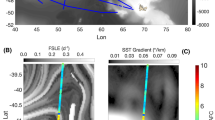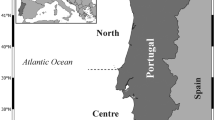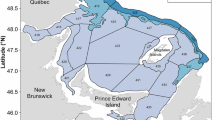Abstract
THE discovery of a potential trawl fishery in an under-developed region may lead to the rapid expansion of the mechanized fleet and the exhaustion of the resource in a very few years; this has recently occurred in Liberia1 and appears to be happening in Ghana2. If it were possible, in the early stages of development, to introduce appropriate mesh-size regulations (together with a vessel-licensing system) the exploitation of the resources might be placed on a more rational basis; but it is characteristic of such a situation both that the research facilities are limited and that the exploited stocks comprise a variety of species, each of which will be selected differently by a particular mesh-size. Devold3 comments on such a situation, which has now arisen through the introduction of modern trawlers on the Brazilian coast.
This is a preview of subscription content, access via your institution
Access options
Subscribe to this journal
Receive 51 print issues and online access
$199.00 per year
only $3.90 per issue
Buy this article
- Purchase on SpringerLink
- Instant access to the full article PDF.
USD 39.95
Prices may be subject to local taxes which are calculated during checkout
Similar content being viewed by others
References
Miller, G. C., U.S. Dept. Interior, Fisheries Leaflet, 440 (1957).
Johnson, F. R., Rep. Fisheries Department, Ghana, 1957 (1958).
Devoid, F., Rep. Govt. Brazil on Fishery Biology. F.A.O. Rpt. 798 (1958).
Graham, M., J. Conseil, 20, (1) 64 (1954).
Margetts, A. R., J. Conseil, 20, (1) 56 (1954).
Cassie, R. M., N.Z. Marine Dept. Fisheries Bulletin, 11 (1955).
Author information
Authors and Affiliations
Rights and permissions
About this article
Cite this article
LONGHURST, A. Prediction of Selection Factors in a Tropical Trawl Fishery. Nature 184, 1170 (1959). https://doi.org/10.1038/1841170a0
Issue date:
DOI: https://doi.org/10.1038/1841170a0



